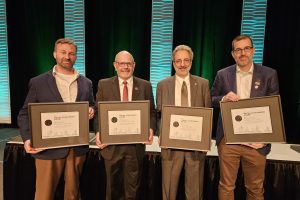
Benjamin Schafer, the Willard and Lillian Hackerman Professor of Civil and Systems Engineering (CaSE), has been recognized with the American Institute of Steel Construction (AISC)’s Special Achievement Award for his for his role as one of the lead investigators in the Steel Diaphragm Innovation Initiative (SDII). The award recognizes the transformative research completed in Phase 1, spanning from 2015 to 2020.
The SDII is a multi-year industry-academic endeavor aimed at advancing the seismic performance of steel floor and roof diaphragms used in steel buildings. In Phase I, the project focused on advancing the understanding and modeling of steel diaphragm structures and how seismic performance could be reengineered to improve building construction and resiliency.
“The SDII is a collaborative effort between academia and industry to address critical challenges in structural engineering. By looking at steel diaphragms as integral components of building systems, and not just as distribution elements, we realized new avenues for enhancing seismic performance while also fully considering new demands such as energy efficiency, acoustic properties, and fire safety. With the code revisions in place, structural engineers can confidently employ steel diaphragm systems to create more resilient structures, especially in areas that are susceptible to natural disasters,” said Schafer.
Department Head James Guest praised Schafer’s dedication to advancing structural engineering knowledge and practice saying that “Ben’s contributions to the field have been tremendous. His leadership in the SDII project exemplifies his commitment to translating research into meaningful change in structural engineering.”
Beyond his work in SDII, Schafer is known for his research in structural stability and the mechanics of thin-walled structures. Notable accomplishments include developing the Direct Strength Method of design, which is an internationally approved method for predicting the strength of cold-formed steel building components, and leading the first full-scale seismic tests on a cold-formed steel framed building. Additionally, as the founding director of the Ralph S. O’Connor Sustainable Energy Institute at Johns Hopkins, Schafer continues to lead pioneering research in sustainable technologies.